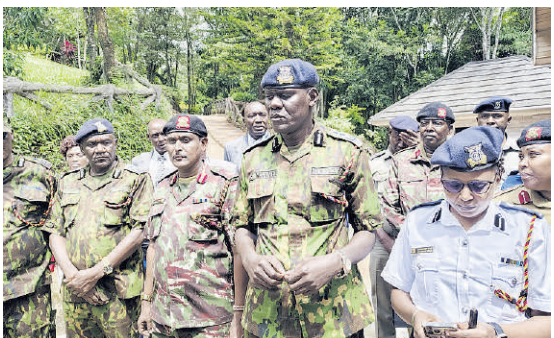
SOCIETY TALK: Are police a law unto themselves?
Brutality in protests bespeaks impunity
“Our target is to have a corruption-free police service," Central Region Police Commander Samuel Ndanyi announced.
In Summary

Police have inaugurated county-level committees to intensify the fight against graft and related criminal activities within the service.
Speaking on Wednesday during a regional security meeting held in Murang’a, Central Region Police Commander Samuel Ndanyi announced that each of the five counties, namely, Murang’a, Nyeri, Kirinyaga, Nyandarua, and Laikipia, will now have a dedicated committee to handle cases of corruption involving police officers.
Ndanyi said the move is in line with a directive from the Inspector General of Police aimed at institutionalising accountability, enhancing professionalism, and restoring public confidence in the police service.
“These committees will develop practical work plans and strategies to fight corruption within the police ranks,” he stated, adding, “They will also serve as watchdogs to ensure transparency and discipline among officers at the county level.”
Ndanyi said for now the committees will have members drawn from the police service, but in the near future officers from other government agencies will be included.
“Our target is to have a corruption-free police service as we endeavour to service all Kenyans professionally and with accountability."
The success of the committees will be evaluated regularly and their recommendations will be implemented to ensure lasting reforms within the police service.
The police commander said police officers working in the Central region have played a key role in the ongoing crackdown on illicit brews and hard drugs.
He said corruption had, in some cases, enabled the illegal businesses to thrive, especially when rogue officers shielded dealers from enforcement.
“To bolster the effectiveness of this fight, the police will work hand-in-hand with the National Government Administrative Officers, including chiefs and assistant county commissioners.”
The committees and NGAO officials, Ndanyi stated, will coordinate intelligence and enforcement operations, including joint raids on known hotspots where illicit alcohol and drugs are sold.
“We are committed to breaking the network that allows illegal brews and narcotics to ruin our communities,” Ndanyi said.
“Any officer found colluding with criminals will be dealt with decisively.”
The commander revealed that for the past one month, 124 persons have been arrested in connection with the brewing and selling of illicit brews and about 85 cases are pending before the courts.
“In this month, 700 litres of illicit brews have been destroyed. We are working with relevant agencies to help in identifying genuine liquor brands stacked on shelves.”
Ndanyi urged the public to volunteer information that could help dismantle illegal operations, assuring them that whistleblowers will be protected.

Brutality in protests bespeaks impunity